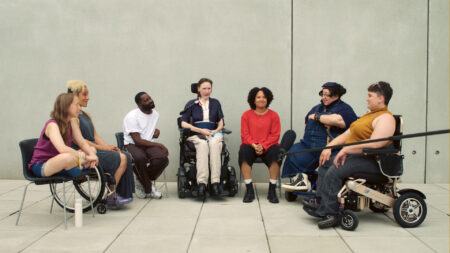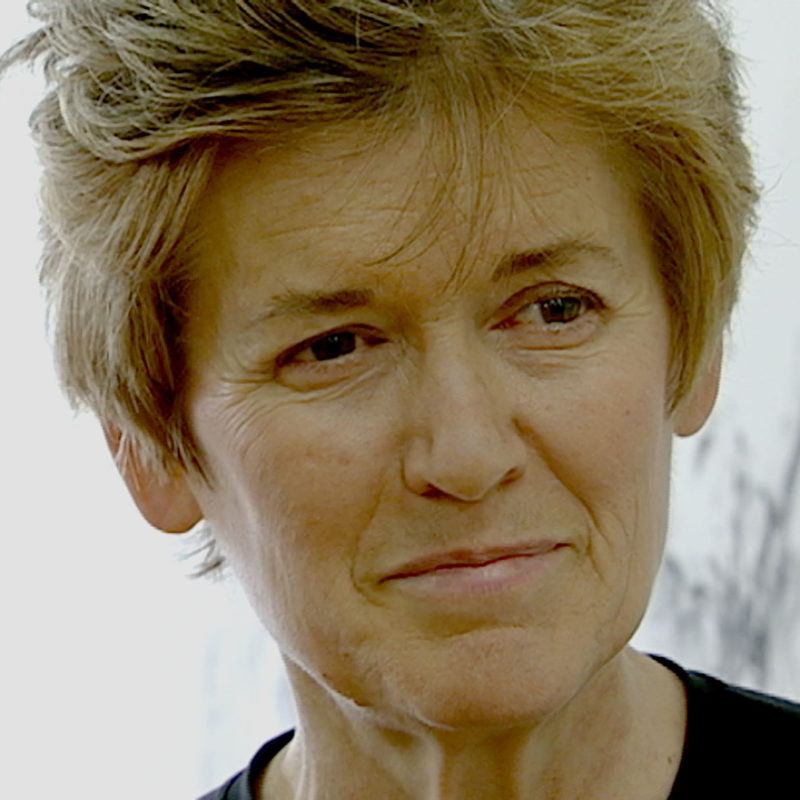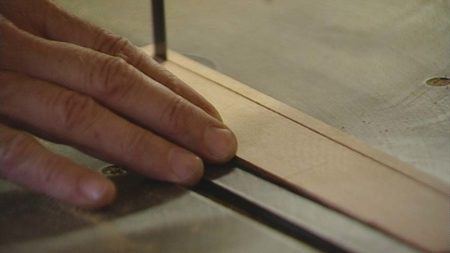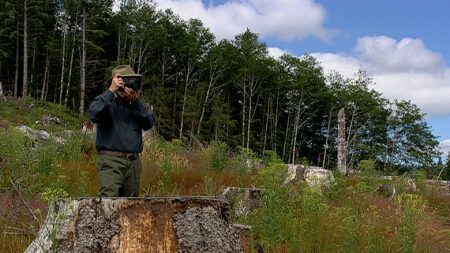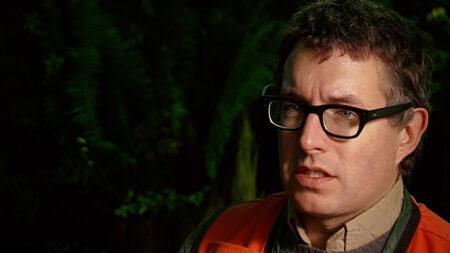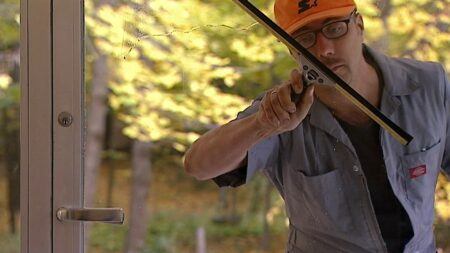Continue playing
(Time remaining: )
Play from beginning
Continue playing "{{ controller.videos[controller.getVideo(controller.currentVideo)].segmentParentTitle}}"
{{controller.videos[controller.getVideo(controller.currentVideo)].title}} has ended.
Ursula von Rydingsvard in "Ecology"
Ursula von Rydingsvard uses sculpture, in part, as a means to express the memories of her childhood. “I grew up…in the post-World War II refugee camps for Polish people in Germany…We stayed in wooden barracks…raw wooden floors, raw wooden walls and raw wooden ceilings… so somewhere in my blood I’m dipping into that source,” she says.
Von Rydingsvard’s studio is filled with massive cedar sculptures, which she painstakingly constructs layer by layer. The end result is a complex and unpredictable surface for viewers to explore and experience. “My whole cedar studio is loaded with pieces that are unfinished and I need all of those things in my environment to feed me, to give me always options.”
Credits
Created by: Susan Sollins & Susan Dowling. Executive Producer & Curator: Susan Sollins. Series Producer: Eve-Laure Moros Ortega. Associate Producer: Migs Wright. Associate Curator: Wesley Miller. Production Manager: Alice Bertoni & Nick Ravich. Production Coordinator: Amanda Donnan & Meredith Klein. Consulting Director: Catherine Tatge. Editor: Steven Wechsler. Director of Photography: Bob Elfstrom, Mark Falstad, Mead Hunt, & Joel Shapiro. Additional Photography: Christine Burrill, Alice Bertoni, & John Gordon Hill. Sound: Tom Bergin, Ray Day, Doug Dunderdale, Heidi Hesse, Mark Mandler, Gabriel Monts, Roger Phenix, Yuri Raicin, & Charles Tomaras. Audio Technician: Drew Weir. Assistant Camera: Craig Feldman & Brian Hwang. Jib Arm Operator: Scott Hoffman. Production Assistant: Carlos Moncada & David Nugent. Additional Animation: Shawn Dunbar.
Creative Consultant: Ed Sherin. Art Direction & Design: Open, New York. On-Line Editor: Don Wyllie. Composer: Peter Foley. Voice-Over Artist: Jace Alexander. Sound Editing: Margaret Crimmins & Greg Smith. Sound Mix: Cory Melious & Tony Volante. Animation Stand: Frank Ferrigno. Assistant Editor: Ahmed Amer, Jennifer Chiurco, & George Panos.
Director of Education & Public Programs: Tana Hargest. Education Consultant: Jessica Hamlin. Manager of Public Programs & Outreach: Kelly Shindler. Web Producer: Ana Otero. Senior Development Officer: Beth Allen. Development Associate: Sara Simonson. Development Coordinator: Erin Cesta & Katherine Payne.
Artworks Courtesy of: Robert Adams; Mark Dion; Iñigo Manglano-Ovalle; Ursula von Rydingsvard; Fraenkel Gallery, San Francisco; Galerie Lelong, New York; Matthew Marks Gallery, New York; Max Protetch, New York; Seattle Art Museum; & Tanya Bonakdar Gallery, New York. Archival Footage Courtesy of: Ursula Anne von Rydingsvard.
Special Thanks: Mark Hereld; Rick Gribenas; Kerstin Adams; ADM Works, Los Angeles; Angela Andres; The Art21 Board of Trustees; James Barber; Vanessa Bergonzoli; Callen Blair; Bloomberg; Josie Browne; Daniel Cheek; Tyler Cufley; Stuart Desmond; Renee Devine; Dog Bark Sound; Kris Douglas; Michael Finn; Frame:Runner NYC; Jules Gaffney; Gina Glascock-Broze; Green River Watershed, King County, WA; Rick Gribenas; Tamara Gubernat; Anthony Guzzone; Anneka Herre; Mark Herald; Todd Holmes; Hyde Park Art Center, Chicago; Stephanie Joson; Bryan King; Meredith Klein; Cristobal Lehyt; Sheila Lynch; Mad. Sq. Art; Anna Miller; J. Morgan Pruett; Julia Murray; Brandon Noble; Jeffrey Peabody; Allison Peters; Eli Ping; J. Morgan Pruett; Andre Ribuoli; Rochester Art Center, Rochester, MN; Seattle Art Museum and Olympic Sculpture Park; Sound Lounge; Dawn Troy; Christina Turley; U.S. General Service Administration; Vagabond Audio; & Javier Valdivieso.
Interns: Stephanie Abraitis, Alex Agnant, Gabriella della Croce, Nora Herting, Milena Hoegsberg, Rives Kitchell, Katie McCurry, Simone Otenaike, Karoline Pfeiffer, Nick Pozek, Carolina Puente, Muña Qamar, Bettina Riccio Henry, Meg Scally, Karen Seapker, Peter Sebeckis, Lucy Strong, & Kelly Williamson.
Public Relations: Goodman Media International. Station Relations: De Shields Associates, Inc. Legal Counsel: Albert Gottesman. Bookkeeper: Marea Alverio-Chaveco & Valerie Riley. Travel Agent: Lita Gottesman.
Major underwriting for Season 4 of Art in the Twenty-First Century is provided by National Endowment for the Arts, PBS, Agnes Gund and Daniel Shapiro, Nathan Cummings Foundation, Bloomberg, The Andy Warhol Foundation for the Visual Arts, The Horace W. Goldsmith Foundation, Bagley Wright Fund, and W.L.S. Spencer Foundation.
Closed captionsAvailable in English, German, Romanian, Italian, Japanese, Korean, Chinese, Italian
Through the Art21 Translation Project, multilingual audiences from around the globe can contribute translations, making Art21 films more accessible worldwide. Translate this video now.
Interested in showing this film in an exhibition or public screening? To license this video please visit Licensing & Reproduction.
Ursula von Rydingsvard’s massive sculptures reveal the trace of the human hand and resemble wooden bowls, tools, and walls that seem to echo the artist’s family heritage in pre-industrial Poland before World War II. She builds towering cedar structures, creating an intricate network of individual beams and sensuous, puzzle-like surfaces. While abstract at its core, von Rydingsvard’s work takes visual cues from the landscape, the human body, and utilitarian objects—such as the artist’s collection of household vessels—and demonstrates an interest in the point where the man-made meets nature.
“I grew up in the post-World War II refugee camps for Polish people in Germany… We stayed in wooden barracks—raw wooden floors, raw wooden walls and raw wooden ceilings… So somewhere in my blood I’m dipping into that source.”
Ursula von Rydingsvard
